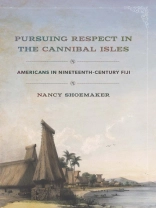Full of colorful details and engrossing stories, Pursuing Respect in the Cannibal Isles shows that the aspirations of individual Americans to be recognized as people worthy of others‘ respect was a driving force in the global extension of United States influence shortly after the nation’s founding.
Nancy Shoemaker contends that what she calls extraterritorial Americans constituted the vanguard of a vast, early US global expansion. Using as her site of historical investigation nineteenth-century Fiji, the ‚cannibal isles‘ of American popular culture, she uncovers stories of Americans looking for opportunities to rise in social status and enhance their sense of self. Prior to British colonization in 1874, extraterritorial Americans had, she argues, as much impact on Fiji as did the British. While the American economy invested in the extraction of sandalwood and sea slugs as resources to sell in China, individuals who went to Fiji had more complicated, personal objectives.
Pursuing Respect in the Cannibal Isles considers these motivations through the lives of the three Americans who left the deepest imprint on Fiji: a runaway whaleman who settled in the islands, a sea captain’s wife, and a merchant. Shoemaker’s book shows how ordinary Americans living or working overseas found unusual venues where they could show themselves worthy of others‘ respect—others‘ approval, admiration, or deference.
Inhaltsverzeichnis
Acknowledgments
Introduction: Why Go a Fiji Voyage?
1. Butenam: Knowledge
2. Mata ki Bau: Respect Vakaviti
3. Chief of All the White Men: Character
4. By a Lady: Moral Authority
5. Marama: Social Class
6. This Hell upon Earth: Competence and Wealth
7. Tui America: Power
Epilogue: Continuity and Change in U.S.-Fiji Relations
Appendix A: Sandalwood Voyages
Appendix B: Bêche-de-Mer Voyages
Appendix C: Foreign Naval Vessels in Fiji to 1860
Abbreviations
Glossary
Notes
Bibliography
Index
Über den Autor
Nancy Shoemaker of the University of Connecticut is a historian of Native American history. Her books include A Strange Likeness, Native American Whalemen and the World, and an edited collection of historical documents and oral histories called Living with Whales. While investigating whaling history, she broadened her interests to include the history of the US in the world, especially in the Pacific.












